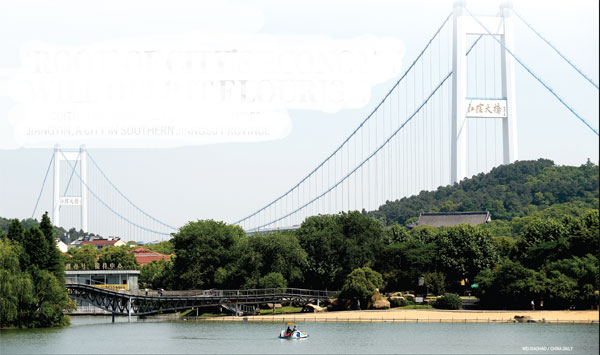'Root' of city's economy will help it flourish
This edition of China Daily special features Jiangyin, a city in southern Jiangsu province
Jiangyinhas had a contradictory character since ancient times.
It was said to be situated at the mouth of Yangtze River,at leastin thetime before the world knew Shanghai, even though it issituated inthenarrowest part of thelast stretch of the river.
It usedto serveas a keymilitaryfortress separatingthesouthside of the Yangtze from the north,therefore cutting theentire country's south fromnorth. But it was also wherealargecross-Yangtzeferry serviceoperated (where now themost sophisticatedcross-Yangtzebridgestands).
Andwith a population of 1.6 million, it is not a particularly large city.There are many larger citiesin China, and, to put it in perspective, the number of residents in Beijing or Shanghaiis over 20 million. Butits GDP, 280 billionyuan($45 billion) in 2015,is largerthanNorthwest China's Qinghai province.
Now,according to a planissued by the State Council, China's Cabinet, in May,Jiangyinand nearby cities in the Yangtze River Delta, including Shanghai,Nanjing,Suzhou andWuxi,areto become a city cluster that will lead changein China during the 13thFive-Year Plan (2016-20).
Yet unlike manycities, where officials point tothe increasing share the service sector contributes to the local GDP,Jiangyin'sofficials say they will betryingdeterminedly to sharpen the city'sadvantageinmanufacturing, whichhas builtupthrough thereform era.Jiangyinwas home to what the Chinese press called the Jiangsu entrepreneurs in the 1980s and 1990s, and is home to some ofthe nation's largest privately-owned industrial companies.
However, it would be wrong to claimJiangyinisignoring the role of services. In fact manylocalmanufacturers have already developed their service arms, some of them online.
Rather, thecity's continuingemphasis on manufacturingreflectswhat its authorities call theprudence of the traditionalfarmers'wayof managing family finances.As ChenJinhu,the city's top official, said,competitiveness in manufacturing is the"root"ofJiangyin'seconomy and the good lives its residents enjoy.
Manufacturing iscertainly the"root" ofthe local government'sfiscal revenue, a rich tax base that allows it tofund local development without relying on sales of land rights or incurring debt, as many other Chinese cities do.And just thinkhow much acash-rich and debt-free city governmentcan financelocaleducation and cultural development.
Indeed,throughoutits history,Jiangyin hasshown its ability to bridge many seeming contradictions.That expertise isthe city'sinvaluable assetinfacilitatingitsongoingtransitionto an even more prosperous future.

(China Daily 07/15/2016 page25)








